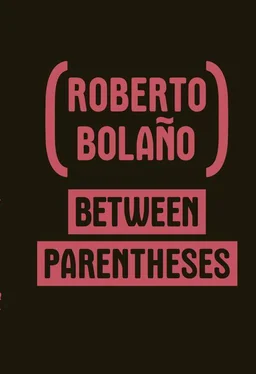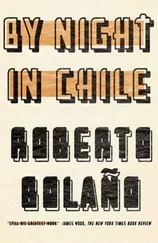Roberto Bolaño - Between Parentheses - Essays, Articles and Speeches, 1998-2003
Здесь есть возможность читать онлайн «Roberto Bolaño - Between Parentheses - Essays, Articles and Speeches, 1998-2003» весь текст электронной книги совершенно бесплатно (целиком полную версию без сокращений). В некоторых случаях можно слушать аудио, скачать через торрент в формате fb2 и присутствует краткое содержание. Год выпуска: 2011, Издательство: New Directions, Жанр: Публицистика, Критика, на английском языке. Описание произведения, (предисловие) а так же отзывы посетителей доступны на портале библиотеки ЛибКат.
- Название:Between Parentheses: Essays, Articles and Speeches, 1998-2003
- Автор:
- Издательство:New Directions
- Жанр:
- Год:2011
- ISBN:нет данных
- Рейтинг книги:4 / 5. Голосов: 1
-
Избранное:Добавить в избранное
- Отзывы:
-
Ваша оценка:
- 80
- 1
- 2
- 3
- 4
- 5
Between Parentheses: Essays, Articles and Speeches, 1998-2003: краткое содержание, описание и аннотация
Предлагаем к чтению аннотацию, описание, краткое содержание или предисловие (зависит от того, что написал сам автор книги «Between Parentheses: Essays, Articles and Speeches, 1998-2003»). Если вы не нашли необходимую информацию о книге — напишите в комментариях, мы постараемся отыскать её.
The Savage Detectives
Between Parenthese
Between Parentheses: Essays, Articles and Speeches, 1998-2003 — читать онлайн бесплатно полную книгу (весь текст) целиком
Ниже представлен текст книги, разбитый по страницам. Система сохранения места последней прочитанной страницы, позволяет с удобством читать онлайн бесплатно книгу «Between Parentheses: Essays, Articles and Speeches, 1998-2003», без необходимости каждый раз заново искать на чём Вы остановились. Поставьте закладку, и сможете в любой момент перейти на страницу, на которой закончили чтение.
Интервал:
Закладка:
The poetry of the first decades of the twenty-first century will be a hybrid creation, as fiction has already become. We may be heading, with terrible slowness, toward new earthquakes of form. In this uncertain future, our children will watch as the poet asleep in an armchair meets up on the operating table with the black desert bird that feeds on the parasites of camels. At some point late in his life, Breton talked about the need for surrealism to go underground, to descend into the sewers of cities and libraries. Then he never spoke on the subject again. It doesn’t matter who said it: THE TIME TO SETTLE DOWN WILL NEVER COME.
The Lost
It’s hard to talk about emblematic figures, figures who might serve us as totem or bridge between the twentieth and the twenty-first centuries. Especially in Latin America, where disastrous, tragic, and caricaturish models have abounded, among them the founding fathers of both the right and the left, who have plunged the continent into something like a cross between a swamp and Las Vegas. But it occurs to me now that Rodrigo Lira could be such a figure, and also that if Rodrigo Lira read this he would laugh. He certainly lived a modest life, but modesty, in Rodrigo’s case, didn’t mean what it does elsewhere on the planet or at least in Latin America, where it’s synonymous with silence and also castration. Modesty, in Rodrigo Lira’s case, was a dangerous mix of elegance and sadness. An elegance and a sadness that could be extreme, that often were extreme, and that in public (and also in private, I suppose, which here means in the most boundless solitude) appeared clad from head to toe in the most caustic humor, as if Rodrigo were a medieval knight lost in a dream that suddenly became a nightmare. He was a poet, of course. Sometimes it’s tempting to think that he was Chile’s last poet, one of the last poets of Latin America. He was born in 1949, which means that he was twenty-four at the time of the coup. From what he wrote, the reader sometimes gets the sense that his world, the geography through which he moved, was limited to a few university departments and a few libraries in Santiago, the city of his birth. Many of his poems are commentaries on the work of older Chilean poets whom he frequented and whose patience he tried: at first glance they seem like jokes, frivolous glosses, insults proffered by a younger man who refuses to grow up, who refuses to enter the adult world. Behind the invective, behind the poet’s laughing response to the frozen carnival of literature, one can find other things, among them horror and a prophetic gaze that proclaims the end of the dictatorship but not the end of stupidity, the end of the military presence but not the end of the quicksand and silence that came with it and that will presumably last forever or for such a long time that, in human terms, it’s an eternity. Prophetic and visionary as he may be, however, it’s other things that really interest Lira. He’s interested in a few women who invariably leave him or even refuse to talk to him. He’s interested in his hair, which he’s losing (as his bald spot grows, so do his sideburns, from tiny to big and bushy, the sideburns of an Independence hero). He’s interested in flowered shirts. He’s interested in a few books that are like black holes, or pretend to be. He’s interested in sociability: imagine someone friendly, attentive, cultured, sensitive, a good son and a good friend, a young man always ready to lend a hand, although this young man is really a time bomb, this young man listens in a different way , this young man is driven by a different kind of loyalty. He’s interested in street talk, argot, the Chilean slang that is our poverty but also one of the few riches we have left (argot, sex, automatic excess), though hidden behind his argot, like a cornered terrorist, is the ultimate vision of what those who own the nation call nation : a territory that was once snatched away from death and that death is now reconquering with a giant’s slow strides. And he writes, and, sometimes — rarely — publishes, but he gives readings, and in this sense Rodrigo Lira is like so many of the Latin American poets of the 1970s and ’80s who drift along and give readings, except that Rodrigo Lira, unlike most of his contemporaries, isn’t an involuntary inhabitant of an incomprehensible dream, but a voluntary resident, someone with his eyes open in the middle of a nightmare. His modesty, however, the modesty that makes him a rare bird, also causes him to soften as much as possible the otherness that the well-intentioned try to pass off as normality. He likes to walk, he likes to give readings, he tries to dress well or at least look as groomed as possible. In 1981 he decides to kill himself. To play it down, in his suicide note he explains that he’s killing himself to protest the recent increase in the price of bread. Or sugar. I can’t remember which. I’m writing this without access to reference books. Enrique Lihn is one of the few who’s written anything about Rodrigo Lira, after Lira was already dead, and I don’t have Lihn’s piece at hand. I seem to remember that he got into a hot bath and slit his wrists. That’s always struck me as a brave and contemplative way to die. Death comes not suddenly but slowly and there’s plenty of time to think: to remember the good moments and the bad, to bid a silent farewell to the beloved and the despised, to recite poetry from memory, to weep. In Rodrigo Lira’s case, it wouldn’t surprise me if he’d also had time to laugh. The best thing about Latin America are its suicides, voluntary or not. We have the worst politicians in the world, the worst capitalists in the world, the worst writers in the world. In Europe we’re known for our complaining and our crocodile tears. Latin America is the closest thing there is to Kafka’s penal colony. We do our best to fool a few naive Europeans and a few ignorant Europeans with terrible books, in which we appeal to their good nature, to political correctness, to tales of the noble savage, to exoticism. The only thing our university graduates and intellectuals want is to teach at some college lost in the American Midwest, just as the goal was once to travel and live on neo-Stalinist handouts, which we thought of as an unprecedented achievement. We’re experts at winning scholarships, scholarships that are sometimes awarded more out of pity than because we deserve them. Our discourse on weath is the closest thing there is to a cheap self-help book. Our discourse on poverty is an imaginary discourse in which the only voices are those of madmen speaking of bitterness and frustration. We hate the Argentines because the Argentines are the closest thing in these parts to Europeans. The Argentines hate us because we’re the mirror in which they see themselves as what they truly are — Americans. We’re racists in the purest sense: that is, we’re racists because we’re scared to death. But our suicides are the best. Take Violeta Parra, who wrote some of our continent’s best songs and fought with everyone and everything and shot herself next to the tent where every night she sang and howled. Take Alfonsina Storni, the most talented woman in Argentina, who drowned herself in the Río de la Plata. Take Jorge Cuesta, gay Mexican writer, who — before he put a bag over his head — castrated himself and nailed his testicles to the door of his bedroom, as a final unreciprocated gift. These great suicides and all their brethren, those who refuse to come in out of the storm (not because they like it out there but among other reasons because they have no place to go), give reason to believe that not everything is lost, as preached by the rise of neoliberalism and the resurgence of the church. We’re children of the Enlightenment, said Rodrigo Lira as he strolled through a Santiago that more than anything resembled a cemetery on another planet. In other words, we’re reasonable human beings (poor, but reasonable), not spirits out of a manual of magic realism, not postcards for foreign consumption and abject national masquerade. In other words: we’re beings who have the historic chance of opting for freedom, and also — paradoxically — life. To the countless number of those killed by the repression one must add the suicide victims who killed themselves for the sake of reason, in the name of reason, which is also the abode of humor. Like so many Latin American poets who died without ever publishing a thing, Rodrigo Lira knew that. In 1984, a small publishing house put out a collection of his poems titled Proyecto de Obras completas [Plan for a Complete Works]. Now, in 1998, it’s impossible to find. And yet no one has taken the trouble to reissue it. In Chile quite a number of books — most of them bad — are published. Rodrigo Lira’s elegance, his disdain, make him off limits for any publisher. The cowardly don’t publish the brave.
Читать дальшеИнтервал:
Закладка:
Похожие книги на «Between Parentheses: Essays, Articles and Speeches, 1998-2003»
Представляем Вашему вниманию похожие книги на «Between Parentheses: Essays, Articles and Speeches, 1998-2003» списком для выбора. Мы отобрали схожую по названию и смыслу литературу в надежде предоставить читателям больше вариантов отыскать новые, интересные, ещё непрочитанные произведения.
Обсуждение, отзывы о книге «Between Parentheses: Essays, Articles and Speeches, 1998-2003» и просто собственные мнения читателей. Оставьте ваши комментарии, напишите, что Вы думаете о произведении, его смысле или главных героях. Укажите что конкретно понравилось, а что нет, и почему Вы так считаете.












